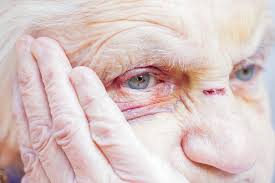 An alleged rape of an 84 year-old grandmother in a St. Louis area nursing home sheds light on the growing problem of elder abuse. Every year hundreds of thousands of older adults are abused, neglected or exploited.
An alleged rape of an 84 year-old grandmother in a St. Louis area nursing home sheds light on the growing problem of elder abuse. Every year hundreds of thousands of older adults are abused, neglected or exploited.
Sadly, for every report of elder abuse, it is estimated that another 23 cases go unreported. Cases are unreported for a variety of reasons – the victim may be unable or unwilling to communicate the abuse, the victim may feel ashamed, or they may not have a trusted person to confide in.
As the Baby Boomers age, more elderly people are receiving assistance through home health agencies, rehabilitation facilities, and long-term care facilities. Seniors in these situations are vulnerable and can fall victim to abuse. For the younger generations, it is important to know and understand the definition of elder abuse, the warning signs, and what to do if abuse is suspected.
In general, elder abuse is a term referring to any knowing, intentional, or negligent act by a caregiver or any other person that causes harm or a serious risk of harm to a vulnerable adult. Most elder care abuse takes place where the seniors live – so at home and at the hands of home health providers or in an institutional setting at the hands of facility employees. All 50 states have some form of elder abuse prevention laws, however the definitions and laws vary greatly by state.
What is elder abuse?
In broad terms, it can be defined as:
- Physical Abuse—inflicting physical pain or injury on a senior, e.g. slapping, bruising, or restraining by physical or chemical means.
- Sexual Abuse—non-consensual sexual contact of any kind.
- Neglect—the failure by those responsible to provide food, shelter, health care, or protection for a vulnerable elder.
- Financial Exploitation—the illegal taking, misuse, or concealment of funds, property, or assets of a senior for someone else’s benefit.
- Emotional Abuse—inflicting mental pain, anguish, or distress on an elder person through verbal or nonverbal acts, e.g. humiliating, intimidating, or threatening.
- Abandonment—desertion of a vulnerable elder by anyone who has assumed the responsibility for care or custody of that person.
- Self-neglect—characterized as the failure of a person to perform essential, self-care tasks and that such failure threatens his/her own health or safety.One sign doesn’t necessarily mean abuse is occurring, but advocates should take notice of:
What are the signs?
- Bruises, pressure marks, broken bones, abrasions, and burns may be an indication of physical abuse, neglect, or mistreatment.
- Unexplained withdrawal from normal activities, a sudden change in alertness, and unusual depression may be indicators of emotional abuse.
- Bruises around the breasts or genital area can occur from sexual abuse.
- Sudden changes in financial situations may be the result of exploitation.
- Bedsores, unattended medical needs, poor hygiene, and unusual weight loss are indicators of possible neglect.
- Behavior such as belittling, threats, and other uses of power and control by spouses are indicators of verbal or emotional abuse.
- Strained or tense relationships, frequent arguments between the caregiver and elderly person are also signs.
The most important thing to remember is Be Alert! Oftentimes the suffering is done in silence. If you notice bruises or changes in a senior’s personality, you should question what is going on. If you suspect abuse, file a complaint with the Department of Health and Senior Services to have the abuse investigated.
You may be the only advocate for the senior victim. It is important to remember it is not your responsibility to prove abuse – it is only your responsibility to report any suspicious activity.
Missouri Department of Health and Senior Services
Adult Abuse and Neglect Hotline: (800) 392-0201
Illinois Department of Aging / Adult Protective Services
24-Hour Adult Protective Services Hotline: (866) 800-1401
Casey & Devoti is a St. Louis-based personal injury law firm with experience handling elder abuse and sexual abuse claims. Together Partners Matt Casey and Matt Devoti have nearly 40 years of trial experience. They handle a variety of personal injury matters, including: car, truck and train crashes, victims of impaired and distracted driving, medical malpractice and birth injuries, product liability, slips/trips/falls, elder care and sexual abuse, Workers’ Compensation, and wrongful death. Matt and Matt proudly serve clients throughout metropolitan St. Louis, southeastern Missouri and southern Illinois. If you or a loved one have been injured by the negligence of another, call the office today for a free, no-obligation consultation: (314) 421-0763.









